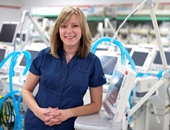
What interested you in becoming a respiratory therapist?
My interest in respiratory therapy came along by happenstance. As a sophomore in high school, we were required to write a paper on a career of our choice and interview someone from that field. At the time I was really interested in forensic science and intended on spending my days processing crime scenes. However, being from a very small town, forensic scientists and crime scene processors are difficult to come by, so a friend leaned over to me and said, “Just write your paper on respiratory therapy and you can interview my grandmother.” So, I did. I was surprised to learn about the critical nature of the field and from that point on began directing my post-secondary choices toward a degree in respiratory therapy.
What physical and/or soft skills do you need to have to succeed?
To maintain a job as a respiratory therapist it is important to be able to mentally and physically manage the job. Mentally, a person needs to be able to make quick comprehensive decisions while maintaining flexibility in both assignment and patients. Physically, a great pair of shoes is the key to success as a health care provider. Along with a lot of standing and walking, a respiratory therapist must possess excellent soft skills. Soft skills are the emotional component needed for working directly with patients. Maintaining an emotionally intelligent approach to all patient care through compassion and empathy will make the patients experience more positive during such a difficult time as well as make interactions with co-workers more effective.
What advice would you give to interested high school students?
The best advice I can give is to contact a respiratory therapy department and spend time with a respiratory therapist on the job. Having a front-line view of the day-to-day requirements will give them a better understanding of the field.
What interested you in working at Cleveland Clinic?
What brought me to the Cleveland Clinic was my interest in the heart patient population. Between the outstanding reputation in heart care and the “Patents First” mission my curiosity to see this department in action as well as my desire to be a part of such an outstanding team brought me here.
What excites you about working as a respiratory therapist?
What excites me as a respiratory therapist is the challenge and success of a complicated patient. I truly enjoy being a part of such an intelligent and outstanding multidisciplinary team of nurses and physicians that come together to create a plan of care and goal of success for each patient.
What has been your most gratifying experience as a respiratory therapist?
As a respiratory therapist, we see many different patients everyday so when one particular patient stands out to me and I’m able to develop a relationship with that patient and their family, it’s very satisfying to see that patient go home with a positive experience at Cleveland Clinic. We strive to provide exceptional care and receiving positive feedback from a patient is a truly gratifying moment.
What career options do you have in this field?
The general job description for a respiratory therapist remains the same for each hospital. The acuity or critical nature of the patient population, however, can vastly differ. This difference is determined by hospital size, location, and specialty area. Some other avenues for respiratory therapy include home care, outpatient pulmonary function testing, sleep studies, and specialty areas including neonatology, pediatrics and adult patient populations.
Learn More
- Respiratory therapy programs affiliated with Cleveland Clinic.
- Visit the respiratory therapy profile for more about this career path.
- Explore the Respiratory Therapy Scholarship webpage.